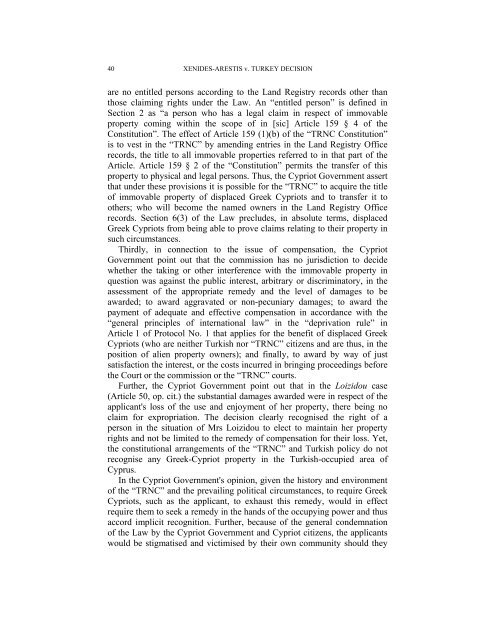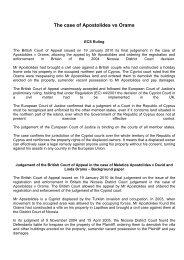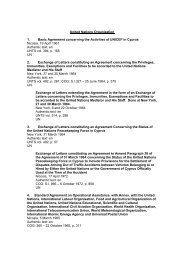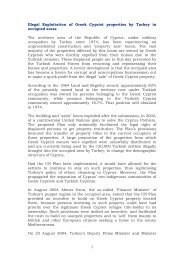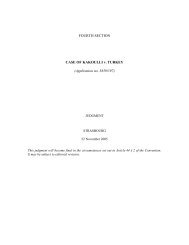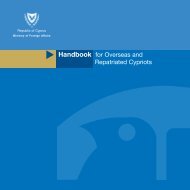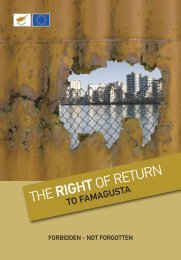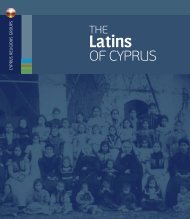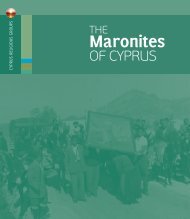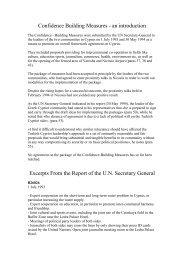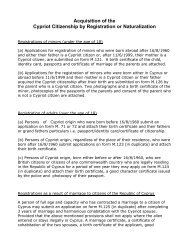Myra Xenides- Arestis v. Turkey
Myra Xenides- Arestis v. Turkey
Myra Xenides- Arestis v. Turkey
You also want an ePaper? Increase the reach of your titles
YUMPU automatically turns print PDFs into web optimized ePapers that Google loves.
40 XENIDES-ARESTIS v. TURKEY DECISIONare no entitled persons according to the Land Registry records other thanthose claiming rights under the Law. An “entitled person” is defined inSection 2 as “a person who has a legal claim in respect of immovableproperty coming within the scope of in [sic] Article 159 § 4 of theConstitution”. The effect of Article 159 (1)(b) of the “TRNC Constitution”is to vest in the “TRNC” by amending entries in the Land Registry Officerecords, the title to all immovable properties referred to in that part of theArticle. Article 159 § 2 of the “Constitution” permits the transfer of thisproperty to physical and legal persons. Thus, the Cypriot Government assertthat under these provisions it is possible for the “TRNC” to acquire the titleof immovable property of displaced Greek Cypriots and to transfer it toothers; who will become the named owners in the Land Registry Officerecords. Section 6(3) of the Law precludes, in absolute terms, displacedGreek Cypriots from being able to prove claims relating to their property insuch circumstances.Thirdly, in connection to the issue of compensation, the CypriotGovernment point out that the commission has no jurisdiction to decidewhether the taking or other interference with the immovable property inquestion was against the public interest, arbitrary or discriminatory, in theassessment of the appropriate remedy and the level of damages to beawarded; to award aggravated or non-pecuniary damages; to award thepayment of adequate and effective compensation in accordance with the“general principles of international law” in the “deprivation rule” inArticle 1 of Protocol No. 1 that applies for the benefit of displaced GreekCypriots (who are neither Turkish nor “TRNC” citizens and are thus, in theposition of alien property owners); and finally, to award by way of justsatisfaction the interest, or the costs incurred in bringing proceedings beforethe Court or the commission or the “TRNC” courts.Further, the Cypriot Government point out that in the Loizidou case(Article 50, op. cit.) the substantial damages awarded were in respect of theapplicant's loss of the use and enjoyment of her property, there being noclaim for expropriation. The decision clearly recognised the right of aperson in the situation of Mrs Loizidou to elect to maintain her propertyrights and not be limited to the remedy of compensation for their loss. Yet,the constitutional arrangements of the “TRNC” and Turkish policy do notrecognise any Greek-Cypriot property in the Turkish-occupied area ofCyprus.In the Cypriot Government's opinion, given the history and environmentof the “TRNC” and the prevailing political circumstances, to require GreekCypriots, such as the applicant, to exhaust this remedy, would in effectrequire them to seek a remedy in the hands of the occupying power and thusaccord implicit recognition. Further, because of the general condemnationof the Law by the Cypriot Government and Cypriot citizens, the applicantswould be stigmatised and victimised by their own community should they


